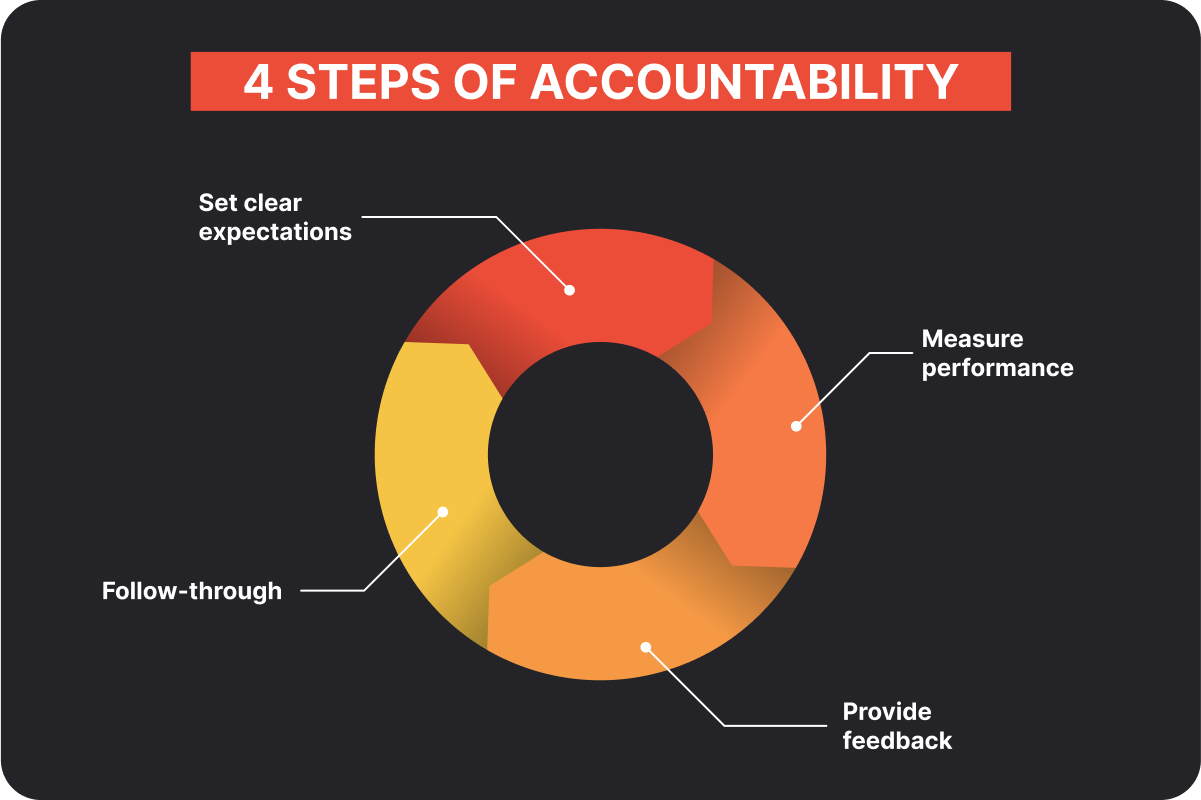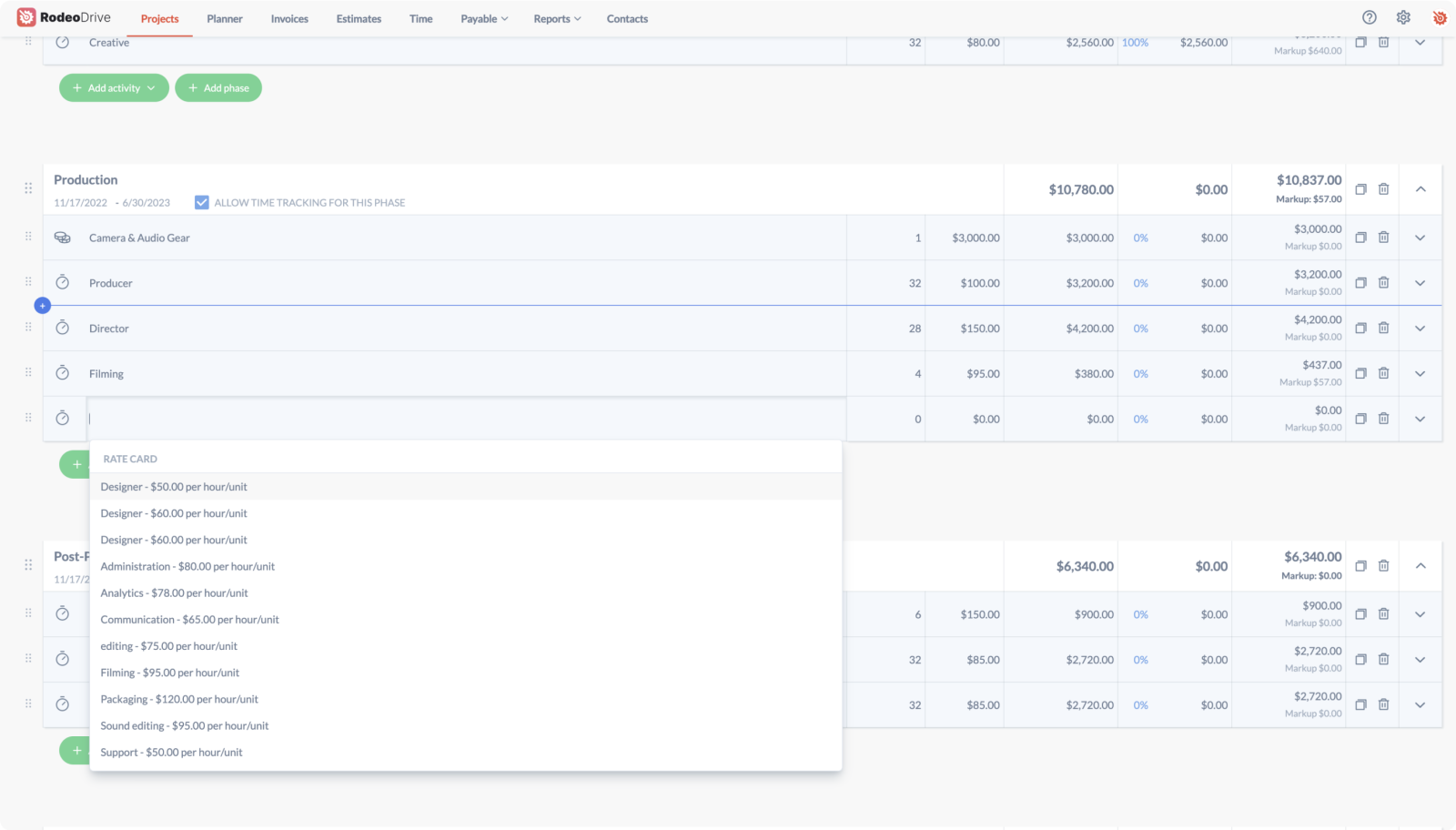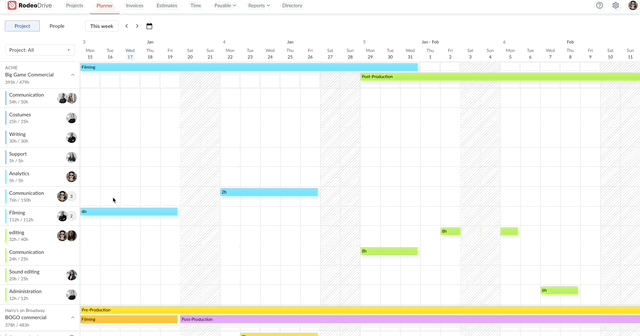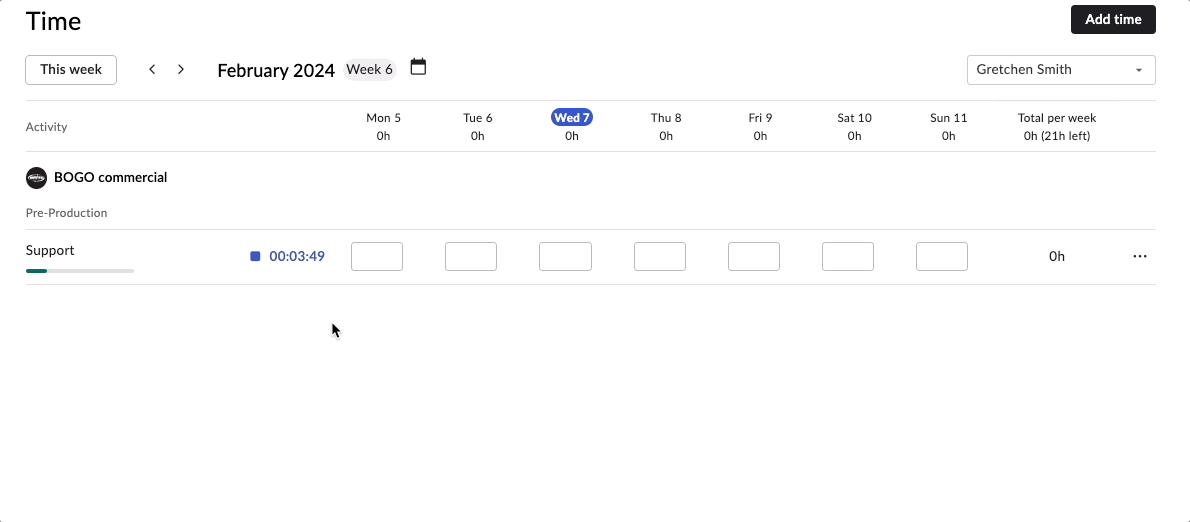Fostering Accountability in the Workplace: 17 Best Practices
Accountability is a fundamental aspect of achieving high performance and unlocking the full potential of creative teams in the workplace. Without it, companies can struggle to meet their strategic goals, and creatives may fall short of their own capabilities.
The good news: by implementing the strategies outlined in this guide, you will be equipped with the tools and insights necessary to drive your projects forward while creating a work environment that nurtures employee accountability, happiness, growth, and success.
What is accountability in the workplace?
Accountability means taking responsibility for your actions, tasks, and results. It involves owning up to your commitments, meeting deadlines, and delivering on expectations.
Being accountable involves being reliable, honest, and dependable in your work. It's about being proactive, taking initiative, and not making excuses or shifting blame when things don't go as planned.
In the workplace accountability also means being open to feedback, learning from mistakes, and continuously striving to improve. Ultimately, it's about being someone that others can trust to get the job done and holding yourself to a high standard of professionalism and integrity in your work.
Examples of accountability in creative teams
Accountability is often associated with taking responsibility for mistakes, and while this understanding is not entirely wrong, team accountability encompasses much more than that. Here are some examples of what accountability in creative teams might look like:
-
Meeting deadlines: In a creative team, accountability can be demonstrated by each team member meeting project deadlines. This includes delivering their assigned tasks, such as design concepts, copywriting, or artwork, on time.
-
Taking ownership: Each team member should be responsible for their ideas, suggestions, and work produced. They should be willing to stand behind their creative choices, take feedback constructively, and make necessary revisions or improvements as required.
-
Collaboration and project communication: Creatives actively contribute ideas, share progress updates, and engage in constructive discussions to ensure alignment. They communicate effectively with each other, seek clarity when needed, and address any challenges or roadblocks together.
-
Quality assurance: Accountability in creative teams means producing work of high quality. Each team member should take responsibility for reviewing their own work and ensuring it meets the team's standards and objectives. This includes checking for errors, consistency, and adherence to branding guidelines or project requirements.
-
Feedback and growth: Team members should actively seek feedback from peers and supervisors, view it as an opportunity for growth, and make necessary adjustments to their work.
-
Contributing to overall team goals: Accountable creative team members support their colleagues, offer assistance when needed, and work collaboratively to ensure the successful completion of projects. They understand how their individual contributions fit into the bigger picture and take responsibility for their role in the team's overall success.
Related: What Does Project Management For Creatives Look Like?
How do you demonstrate accountability at work?

According to Gallup, a mere 14% of employees believe that their performance is managed in a way that genuinely inspires them, and a staggering 40% feel that their manager does not hold them accountable for the goals they have set. These statistics shed light on the urgent need to reimagine and improve accountability practices in the workplace.
But how do you demonstrate accountability as a project manager while there are so many things already on your plate? Look at these four steps, they work together in a cyclical manner.
-
Set clear expectations: Clearly communicate expectations and desired outcomes. This first step involves defining specific goals, objectives, and performance standards, as well as discussing the timeline and any relevant guidelines or requirements.
-
Measure performance: Establish metrics and mechanisms to track progress and measure performance. This could involve establishing benchmarks and implementing regular performance evaluations.
-
Provide feedback: This can involve praising accomplishments, addressing areas for improvement, and discussing ways to enhance effectiveness and productivity. Feedback should be specific, actionable, and focused on helping the project and individuals grow and succeed.
-
Follow-through: Implement appropriate consequences or rewards based on their outcomes. This may involve recognizing and rewarding exemplary performance and addressing underperformance through coaching or training.
Don't forget that art of fostering accountability at work also involves constancy improvement. Take a look at these 12 ways to improve team accountability guide to help you with that.
Related: Performance Reporting Tools for Project Management
How to foster a culture of accountability in the workplace
Developing accountability within a creative team can be multifaceted, but be aware of the common pitfall of micromanagement since no one likes a manager breathing down their neck.
Create a supportive environment that fosters accountability rather than suffocating your team with excessive oversight. Here are 17 easy ways to help your team (and yourself) become more accountable at work.
1. Set SMART goals
SMART goals are a widely recognized framework for goal setting that stands for Specific, Measurable, Achievable, Relevant, and Time-bound.
SMART goals are valuable for tracking individual efforts as they are typically focused on a single metric, great for team members who are dedicated to a component of a larger project.
Keep in mind: it's important for organizations to strike a balance between utilizing the benefits of SMART goals while also incorporating more dynamic goal-setting approaches that align with the ever-changing demands of the creative industry.
Also read: How to Set Marketing OKRs in 10 Steps
2. Promote autonomy

As a project manager, you can’t do everything at once. There are so many moving parts in project management, it’s almost impossible to be in the know of every single detail.
That’s when capacity planning comes into play. Delegate responsibilities and empower team members to make decisions and take ownership of their work but promote communication and updates.
Clear guidelines and communicating the boundaries within which team members can make decisions can help avoid discussions. Clarify any limitations, constraints, or areas where approvals are required to ensure that decisions align with organizational goals and policies.
3. Establish accountability partnerships
Encourage team members to pair up and hold each other accountable for their goals and commitments.
First, discuss the expectations and write them down. Make the notes accessible to the whole team to promote transparency. Then, determine the specific accountability mechanisms that will be used to track progress and hold each other accountable. This could include regular check-ins, project progress reports, goal-tracking tools, or shared accountability documents.
Regularly evaluate the effectiveness of the accountability partnership and make adjustments as necessary. If certain approaches or goals are not working, be open to modifying them to better align with the needs and aspirations of both partners.
4. Create a system for tracking progress
Identify and implement the right tools or software to help you track and monitor progress effectively. This can include project management platforms, task management software, spreadsheet programs, or specialized tracking tools.
Read how you can evaluate the best project management software for your team and start your search.
5. Regularly revisit and realign goals
Things change and you might want to add or revisit your goals. This could happen when your project scope changes.
Start by determining how often goals should be revisited and realigned. This can vary depending on the nature of your project. Set specific dates or milestones for goal reviews, for example, after each project phase.
6. Lead by example

Accountability sets the foundation for a successful project, and it begins with, well, you!
When project managers demonstrate personal accountability, it sets the tone for the entire team.
It means taking ownership of problems instead of pointing fingers at team members. Although it can be challenging, speaking up and taking responsibility is crucial for fostering a culture of accountability and trust within the organization.
7. Promote a learning environment
Create an environment where curiosity is valued. Reward curiosity among your team by encouraging them to ask questions, explore new ideas, and seek knowledge. Team up with a knowledge institute or event that aligns with your company.
Or, implement a mentorship program that pairs experienced employees with those who are eager to learn. Mentors can provide guidance, share knowledge, and offer support to mentees, fostering a culture of both learning and accountability.
Pro tip: Regularly asking team-building questions can help bring everyone closer together.
8. Address underperformance promptly
Clearly identify the specific areas of underperformance and make sure to gather concrete evidence to support your observations. For example, missed deadlines, poor quality of work, or failure to meet performance metrics. Act as soon as you can and schedule a general update meeting first with the whole team. Good chance underperformance is not tied to a single person but a pattern.
9. Bring structure to the creative production process
Planning is the beating heart of every project. Create a detailed timeline that outlines the key milestones, deadlines, and deliverables for the project. Break down the work into smaller tasks and allocate appropriate timeframes for each stage of production and tag your team members. With everything clearly mapped out, everybody can see exactly where the project stands.
Ensuring your team has everything they need to work as efficiently and productively as possible improves their accountability, as there are no excuses.
10. Accept constructive criticism and input from your team
Regularly asking your team for their insights, suggestions, and areas where you can improve demonstrates your openness to feedback and creates a collaborative environment.
Share how you have applied the input and the outcomes you have achieved. This reinforces your accountability and encourages others to provide constructive criticism.
11. Don’t leave the difficult conversations for later
Ok, it’s time to address the elephant in the room.
You might hesitate to engage in challenging conversations with your team, or you are unsure of how to approach sensitive topics. There is a natural concern that the conversation may not go well and that it could upset the team member.
However, in order to foster accountability and a commitment to achieving objectives, it is necessary to address issues openly. When initiating these conversations, it is important to present your case using factual evidence and data to support your points. However, it is equally important to take a moment to listen and understand their perspective. Creating an open dialogue allows for a more logical and balanced discussion.
Ending the conversation on a positive note is crucial. You want people to feel motivated to improve and believe in their ability to do better.
12. Encourage self-assessment
Start by emphasizing the value of self-assessment as a tool for personal and professional growth. Explain how self-reflection can help individuals identify their strengths, and areas for improvement, and set goals for their development.
Encourage employees to regularly review their goals, assess their progress, and make necessary adjustments. This iterative process ensures that self-assessment remains an ongoing practice and helps make team members accountable for their work and growth.
13. Trust your team members
Sounds simple enough, right? Your team members are here for a reason, they are hired for their expertise and craft. We’ve all adapted to new ways of doing things. Working from home, remote, or hybrid are no exceptions. Even when your team is not always physically together in a room, avoid micromanaging and promote accountability and self-reflection to improve job satisfaction.
14. Make accountability a habit
Consistency is key here, and it starts with you as the project manager. Accountability is a collective effort that involves both individuals and the entire team. By continuously reinforcing accountability through clear expectations, open communication, support, recognition, and continuous improvement, you can create a work environment where accountability becomes a natural and ingrained habit for everyone.
15. Don’t instill fear in your team
Don’t make them go: uh oh, here comes our project manager again. Encourage teamwork, cooperation, and knowledge sharing to build a supportive and inclusive work environment. It’s ok to make mistakes and set the tone for a positive work environment by demonstrating respectful and supportive behavior. Simply put, we have no time for the blame game.
16. Promote honesty
You can’t improve if you don’t know what could be done better. Even when the truth is a toughie, make sure honesty is rewarded. Here are a few ways you can do this:
Recognize and reward honesty: Recognize individuals who demonstrate ethical behavior and promote a culture where honesty is celebrated and rewarded.
Build trust: Trust is the foundation of honesty. Invest time in building trusting relationships with your team members. Trust their capabilities, respect their confidentiality, and be reliable in your commitments.
Celebrate mistakes as learning opportunities: Mistakes should be viewed as opportunities for growth and learning. Encourage team members to share their mistakes, lessons learned, and solutions implemented.
17. Celebrate the successes
Another project done and dusted? Pop the champagne! As soon as the last client meeting is done, gather the team and evaluate what went according to plan and what can be improved for next time. Reserve some time during the meeting to praise each team member for a specific achievement.
Want to do something fun? Take your pick: Here are our 30 most effective team building activities for creative teams
Fostering accountability with the right tool
Accountability leads to great project outcomes, and remember: effectively tracking project progress is just as important as setting goals. Measure accountability and accuracy through a performance management method that will remind you to check in regularly.
But in terms of looking at accountability in a factual manner, a project management software tool is your best bet. When you opt for an all-in-one system like Rodeo Drive, your team will log their hours, complete tasks, and collaborate in one place.
Here’s how it works:
Start with a solid project budget

With Rodeo Drive’s budgeting feature, you’ll be able to increase revenue by planning your project budget in phases which can then be invoiced directly from the tool or via QuickBooks integration (US).
Allocate tasks

A successful project can’t happen alone. Harness the skills of your team where they work best with Rodeo Drive. Effectively manage your team’s workload by planning and assigning tasks based on availability to ensure no one has too much on their plate.
Track time

Every time activity you record in Rodeo Drive is connected to its respective budgeted time activity, so your project budget is automatically updated as you work. This way, you’ll have a real-time understanding of the budget percentage you’ve already spent.
Get the data you need to improve accountability
Get the insights you need on team performance before your next check-in meeting. Rodeo Drive’s interconnected features bring you a set of detailed reports on employee productivity, time registration, and project profitability. This way, you can build future project plans with past outcomes in mind.
Want to find out more about how Rodeo Drive can help you map out your project and monitor progress? Start for free today.








